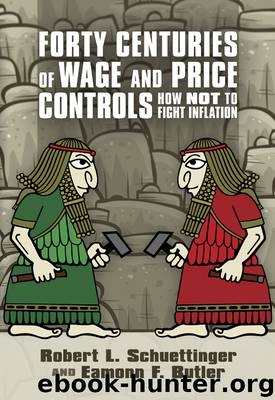Forty Centuries of Wage and Price Controls by Robert L. Schuettinger & Eamonn F. Butler

Author:Robert L. Schuettinger & Eamonn F. Butler [Schuettinger, Robert L.]
Language: eng
Format: epub
ISBN: 978-1610-1614-0-4
Publisher: The Heritage Foundation
CONTROLS IN ARGENTINA
On the South American continent, similar controls were tried and failed. Perhaps the most celebrated inflation rate in that part of the world belongs to Argentina, despite the price-fixing attempts of the administration of Juan Peron. But his controls, which lasted (on and off) from 1946 to 1955, did not mollify it. As Congressman Philip Crane said in the House of Representatives on the subject of the United States’ Economic Stabilization measures:
In June 1947, the [Argentine] government instituted a program of fixing retail prices and seized factory stocks of clothing and shoes for distribution at these prices. Numerous price violators were arrested. Then, in an attempt to control prices, the Government began to subsidize foodstuffs in the 1948–49 period. It bought wheat from the farmers and sold it to the miller in an attempt to control the price of bread. The same policy was followed with regard to meat, cooking oils, and the milk supply. The controls did not work and in 1949 all public services, including railroads, increased prices. The cost of other commodities increased: Gasoline rose from 35 to 60 centavos per liter, bread from 50 to 80 centavos per loaf, meat from 1.80 pesos to 2.50 pesos, and clothing prices soared.16
At the end of the 1940s, Peron supported increases in wages although he tried to keep them down as far as possible. An example of the ineffectiveness of this policy was his grant of a sixty percent wage increase to workers in the important sugar industry. The military also received substantial increases, and this sparked off a new round of pay demands.
Despite his control of the General Confederation of Labor, Peron could not continue to hold down wages; his demand in 1954 that wage increases should be tied to a very low target precipitated an epidemic of wildcat strikes in many industries. And because of his failures, Peron lost support in the country, and resigned under military pressure on September 19, 1955.
Download
This site does not store any files on its server. We only index and link to content provided by other sites. Please contact the content providers to delete copyright contents if any and email us, we'll remove relevant links or contents immediately.
International Integration of the Brazilian Economy by Elias C. Grivoyannis(110173)
The Radium Girls by Kate Moore(12018)
Turbulence by E. J. Noyes(8040)
Nudge - Improving Decisions about Health, Wealth, and Happiness by Thaler Sunstein(7693)
The Black Swan by Nassim Nicholas Taleb(7109)
Rich Dad Poor Dad by Robert T. Kiyosaki(6612)
Pioneering Portfolio Management by David F. Swensen(6289)
Man-made Catastrophes and Risk Information Concealment by Dmitry Chernov & Didier Sornette(6007)
Zero to One by Peter Thiel(5786)
Secrecy World by Jake Bernstein(4741)
Millionaire: The Philanderer, Gambler, and Duelist Who Invented Modern Finance by Janet Gleeson(4465)
The Age of Surveillance Capitalism by Shoshana Zuboff(4277)
Skin in the Game by Nassim Nicholas Taleb(4239)
The Money Culture by Michael Lewis(4198)
Bullshit Jobs by David Graeber(4179)
Skin in the Game: Hidden Asymmetries in Daily Life by Nassim Nicholas Taleb(3991)
The Dhandho Investor by Mohnish Pabrai(3759)
The Wisdom of Finance by Mihir Desai(3735)
Blockchain Basics by Daniel Drescher(3574)
